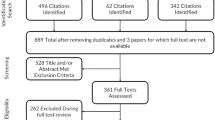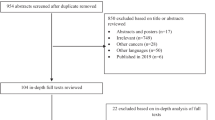Abstract
Background
An understanding of health-related quality of life (HRQOL) is of utmost importance in both oncological and esthetic breast surgery. The BREAST-Q is a patient-reported outcome (PRO) measure that investigates HRQOL and patient satisfaction before and after breast surgery. The aim of this study was to develop a Japanese version of the BREAST-Q including the mastectomy module, the reconstruction module, the augmentation module and the reduction/mastopexy module, and to assess the psychometric properties of the mastectomy module among Japanese women.
Methods
The Japanese version of the BREAST-Q was developed through forward translation, backward translation and patient testing. Traditional psychometric testing of the mastectomy module was administered to 45 post-mastectomy patients.
Results
The mastectomy, reconstruction, augmentation and reduction/mastopexy modules were formally developed into Japanese. Despite cultural difference between Japanese women and original target population, the contents were considered to be valid among Japanese woman. With the exception of the sexual well-being subscale, good reliability and validity were evident for the mastectomy module (Test–retest reliability 0.76–0.95, Chronbach’s alpha coefficient 0.77–0.98).
Conclusions
The BREAST-Q Japanese version is a useful PRO measure for investigating the impact of breast surgery on HRQOL and patient satisfaction. Further validation in younger Japanese women is needed to determine the usefulness of the sexual well-being subscale.
Similar content being viewed by others
References
Shimozuma K, Ganz PA, Petersen L, Hirji K. Quality of life in the first year after breast cancer surgery: rehabilitation needs and patterns of recovery. Breast Cancer Res Treat. 1999;56:45–57.
Ganz PA, Desmond KA, Leedham B, Rowland JH, Meyerowitz BE, Belin TR. Quality of life in long-term, disease-free survivors of breast cancer: a follow-up study. J Natl Cancer Inst. 2002;94:39–49.
Ware JJ, Sherbourne C. The MOS 36-item short-form health survey (SF-36) I conceptual framework and item selection. Med Care. 1992;30:473–83.
Sprangers MA, Groenvold M, Arraras JI, Franklin J, te Velde A, Muller M, et al. The European organization for research and treatment of cancer breast cancer-specific quality of life questionnaire module: first results from a three-country field study. J Clin Oncol. 1996;14:2756–68.
Aaronson NK, Ashmedzai S, Bergman B, Bullinger M, Cull A, Duez NJ, et al. The EORTC QOL-C30: a quality of life instrument for use in international clinical trials in oncology. J Natl Cancer Inst. 1993;85:365–76.
Brady MJ, Cella DF, Mo F, Bonomi AE, Tulsky DS, Lloid SR, et al. Reliebility and validity of the functional assessment of cancer therapy-breast quality-of-life instrument. J Clin Oncol. 1997;15:974–86.
Housheer FH, Schilsky RL, Brain S, Berghorn EJ, Lieberman F. Diagnosis, management, and evaluation of chemotherapy-induced peripheral neuropathy. Semin Oncol. 2006;33:15–49.
Bjelland I, Dahl AA, Haug TT, Neckelmann D. The validity of the hospital anxiety and depression scale. An updated literature review. J Psychosom Res. 2002;52:69–77.
Hurst NP, Kind P, Ruta D, Hunter M, Stubbings A. Measuring health-related quality of life in rheumatoid arthritis: validity, responsiveness and reliability of EuroQol (EQ-5D). Br J Rheumatol. 1997;36:551–9.
Ohsumi S, Shimozuma K. Current status and future perspectives of patient-reported outcome research in clinical trials for patients with breast cancer in Japan. Breast Cancer. 2013;20:296–301.
Takei H, Ohsumi S, Shimozuma K, Takehara M, Suemasu K, Ohashi Y, et al. Health-related quality of life psychological distress, and adverse events in postmenopausal women with breast cancer who receive tamoxifen, exemestane, or anastrozole as adjuvant endocrine therapy: national surgical adjuvant study of breast cancer 04 (N-SAS BC 04). Breast Cancer Res Treat 2012;133:227–36.
Shimozuma K, Ohashi Y, Takeuchi A, Aranishi T, Morita S, Kuroi K, et al. Feasibility and validity of the patient neurotoxicity questionnaire during taxane chemotherapy in a phase III randomized trial in patients with breast cancer: N-SAS BC 02. Support Care Cancer. 2009;17:1483–91.
Taira N, Shimozuma K, Shiroiwa T, Ohsumi S, Kuroi K, Saji S, et al. Associations among baseline variables, treatment-related factors and health-related quality of life 2 years after breast cancer surgery. Breast Cancer Res Treat. 2011;128:735–47.
Kurihara M, Shimizu H, Tsuboi K, Kobayashi K, Mutakami M, Eguchi K, et al. Development of quality of life questionnaire in Japan: quality of life assessment of cancer patients receiving chemotherapy. Psycho-Oncol. 1999;8:355–63.
Wilkins EG, Cedema PS, Lowery JC, Davis JA, Kim HM, Roth RS, et al. Prospective analysis of psychosocial outcomes in breast reconstruction: one-year postoperative results from the Michigan breast reconstruction outcome study. Plas Reconstr Surg. 2000;106:1014–25.
Baxter NN, Goodwin PJ, McLeod RS, Dion R, Devins G, Bombardier C. Reliability and validity of the body image after breast cancer questionnaire. Breast J. 2006;12:221–32.
Pusic AL, Klassen AF, Scott AM, Klok JA, Cordeiro PG, Cano SJ. Development of a new patient-reported outcome measure for breast surgery: the BREAST-Q. Plast Reconstr Surg. 2009;124:345–53.
Cano SJ, Klassen AF, Scott AM, Cordeiro PG, Pusic AL. The BREAST-Q: further validation in independent clinical samples. Plast Reconstr Surg. 2012;129:293–302.
Cano SJ, Klassen AF, Scott AM, Pusic AL. A closer look at the BREAST-Q. Clin Plast Surg. 2013;40:287–96.
U.S. department of health and human services FDA center for drug evaluation and research, U.S. department of health and human services FDA center for biologics evaluation and research, U.S. department of health and human services FDA center for devices and radiological health. Guidance for industry: patient-reported outcome measures: use in medical product development to support labeling claims: draft guidance. Health Qual Life Outcomes. 2006;4:79. doi:10.1186/1477-7525-4-79.
Aaronson N, Alonso J, Burnam A, Lohr KN, Patrick DL, Perrin E, et al. Assessing health status and quality-of-life instruments: attributes and review criteria. Qual Life Res. 2002;11:193–205.
Rasch G. Probabilistic models for some intelligence and attainment tests. Copenhagen: The danish institute for educational research; 1960.
Acquadro C, Conway K, Giroudet C, Mear I. Linguistic validation manual for health outcome assessments. Lyon: MAPI institute; 2012.
Reich M, Lesur A, Perdrizet-Chevallier C. Depression, quality of life and breast cancer: a review of the literature. Breast Cancer Res Treat. 2008;110:9–17.
Cororve GM, Teo I, Epner DE. Managing body image difficulties of adult cancer patients. Cancer. 2014;120:633–41.
Reaby LL. Reasons why women who have mastectomy decide to have or not to have breast reconstruction. Plast Reconstr Surg. 1988;101:1810–8.
Kanatas A, Velikova G, Roe B, Horgan K, Ghazali N, Shaw RJ, et al. Patient-reported outcomes in breast oncology: a review of validated outcome instruments. Tumori. 2012;98:678–88.
Acquadro C, Conway K, Hareendran A, Aaronson N. European regulatory issues and quality of life assessment (ERIQA) group. Literature review of methods to translate health-related quality of life questionnaires for use in multinational clinical trials. Value Health. 2008;11:509–21.
Wild D, Grove A, Mrtin M, Eremenco S, Verjee-Lorenz A, Erikson P. ISPOR task force for translation and cultural adaptation. Principles of good practice for the translation and cultural adaptation process for patient-reported outcomes (PRO) measures: report of the ISPOR task force for translation and cultural adaptation. Value Health. 2005;8:94–104.
Morton H, Gorzalka BB. Cognitive aspects of sexual functioning: differences between East Asian-Canadian and Euro-Canadian women. Arch Sex Behav. 2013;42:1615–25.
Laumann EO, Palk A, Glasser DB, Kang JH, Wang T, Levinson B, et al. A cross-national study of subjective sexual well-being among older women and men: findings from the Global Study of Sexual Attitudes and Behaviors. Arch Sex Behav. 2006;35:145–161.
Cain VS, Johannes CB, Avis NE, Mohr B, Schocken M, Skurnick J, et al. Sexual functioning and practices in a multi-ethnic study of midlife women: baseline results from SWAN. J Sex Res. 2003;40:266–76.
Moore KL. Sexuality and sense of self in later life: Japanese men’s and women’s reflections on sex and aging. J Cross Cult Gerontol. 2010;25:149–63.
Takahashi M, Kai I. Sexuality after breast cancer treatment: changes and coping strategies among Japanese survivors. Soc Sci Med. 2005;61:1278–90.
Takahashi M, Kai I, Hisata M, Higashi Y. Attitudes and practices of breast cancer consultations regarding sexual issues: a nationwide survey of Japanese surgeons. J Clin Oncol. 2006;24:5763–8.
Rosson GD, Shridharani SM, Magarakis M, Manahan MA, Basdag B, Gilson MM, et al. Quality of life before reconstructive breast surgery: a preoperative comparison of patients with immediate, delayed, and major revision reconstruction. Microsurgery. 2013;33:253–8.
Zhong T, McCarthy C, Min S, Zhang J, Beber B, Pusic AL, et al. Patient satisfaction and health-related quality of life after autologous tissue breast reconstruction: a prospective analysis of early postoperative outcomes. Cancer. 2012;118:1701–9.
Eltahir Y, Werners LL, Dreise MM, van Emmichoven IA, JansenL Werker PM, et al. Quality-of-life outcomes between mastectomy alone and breast reconstruction: comparison of patient-reported BREAST-Q and other health-related quality-of-life measures. Plast Reconstr Surg. 2013;132:201e–9e.
Huang JJ, Chao LF, Wu CW, Nguyen DH, Valerio IL, Cheng MH. Simultaneous scarless contralateral breast augmentation during unilateral breast reconstruction using bilateral differentially split DIEP flaps. Plast Reconstr Surg. 2011;28:593e–604e.
Acknowledgments
The authors are grateful to M. Yamashita, T. Waring and R. Waring for joining our project as translators. We appreciate the help of Y.Tsuyumu, S.Ogawa and K.Shimizu with the collection of data. This work was supported by JSPS KAKENHI Grant number 15k08713.
Author information
Authors and Affiliations
Corresponding author
Ethics declarations
Conflict of interest
The authors declare that they have no conflict of interest.
About this article
Cite this article
Saiga, M., Taira, N., Kimata, Y. et al. Development of a Japanese version of the BREAST-Q and the traditional psychometric test of the mastectomy module for the assessment of HRQOL and patient satisfaction following breast surgery. Breast Cancer 24, 288–298 (2017). https://doi.org/10.1007/s12282-016-0703-6
Received:
Accepted:
Published:
Issue Date:
DOI: https://doi.org/10.1007/s12282-016-0703-6




